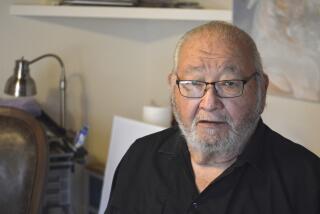Jose Saramago dies at 87; Portuguese novelist won the 1998 Nobel Prize in literature
Jose Saramago, winner of the 1998 Nobel Prize in literature for early novels that explored historical themes from unconventional angles and later works in which inexplicable events threaten society’s underpinnings, has died. He was 87.
The writer died Friday at his home in Lanzarote, one of Spain’s Canary Islands, of multiple organ failure after a long illness, the Jose Saramago Foundation said.
Saramago, the only Portuguese winner of the literary prize, was 60 before he wrote most of the novels for which he was honored, having worked as a car mechanic, civil servant, production manager in a publishing company and newspaper editor before becoming a full-time writer.
He joined the Portuguese Communist Party in 1969 during a dictatorship that had outlawed the party, and was a contentious figure in the nation’s public life.
After a military-led government with communist participation took power in 1974, Saramago the next year became deputy director of a leading newspaper, Diario de Noticias, where opponents on the staff said he helped impose pro-government news coverage. He was fired after a November 1975 confrontation that reduced the communists’ role in the government.
In 1991, the government blocked the nomination of his novel, “The Gospel According to Jesus Christ,” for a European literary prize, calling it offensive to Catholics. In the book, Saramago portrays a Jesus who has sex with Mary Magdalene and is a pawn in a power struggle between God and the devil. The government’s decision prompted him and his wife, Spanish journalist Pilar del Rio, to leave Portugal for the Canary Islands, where he lived for the rest of his life.
In 2002, when he and other writers visited the Israeli-occupied West Bank, he said Israel was guilty of “a crime we put on the same plane as what happened at Auschwitz.” He later said he chose the reference to Auschwitz to provoke a response from Israelis.
The Nobel committee, in awarding the prize, praised the “rich, multifaceted” prose, the “wealth of imagination” and the “skillfully evoked atmosphere of unreality” in Saramago’s works.
His writing was marked by long sentences and paragraphs, minimal punctuation and frequent digressions on human nature. “Probably I’m an essay writer who, as he doesn’t know how to write essays, writes novels instead,” he said in an interview cited in the Guardian newspaper in 2002.
U.S. literary critic Harold Bloom called Saramago “the most impressive living novelist, who overshadows all other living Europeans and all Americans too.”
Several of his novels in the 1980s examined periods of Portuguese history, including “Baltasar and Blimunda,” a love story set in the early 18th century, and “The History of the Siege of Lisbon,” about a proofreader at a publisher who rewrites the history of the 12th-century conquest of Lisbon.
His later books focused on other themes. “Blindness” described an unnamed city hit by an epidemic of unexplained sudden blindness, depicting the ensuing social and political breakdown. It was made into a 2008 movie starring Mark Ruffalo and Julianne Moore. In “The Stone Raft,” Iberia literally breaks off from the rest of Europe, and in “The Double,” Saramago describes a man’s reaction when he learns he has an exact physical double.
Jose de Sousa Saramago was born Nov. 16, 1922, in Azinhaga, a village near Lisbon. From a poor family, he never finished college but continued to study part time while supporting himself as a metalworker.
He published a novel in the 1940s and wrote another that wasn’t published, then gave up writing for decades, as “I had nothing worthwhile to say,” he wrote on the Nobel site.
He worked at various jobs until 1975, when he focused full time on writing.
In addition to his wife, Saramago is survived by a daughter from his first marriage.
More to Read
Start your day right
Sign up for Essential California for the L.A. Times biggest news, features and recommendations in your inbox six days a week.
You may occasionally receive promotional content from the Los Angeles Times.






